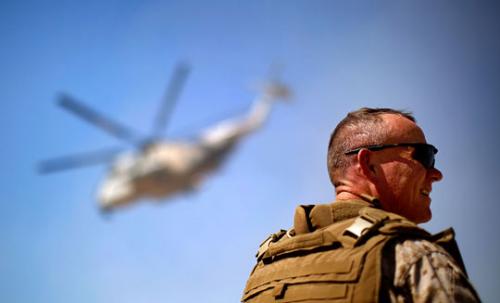Afghans warned off Taliban ahead of offensive
OUTSKIRTS OF MARJAH: US-led troops Friday dropped leaflets and broadcast radio messages warning Afghans not to shelter the Taliban as they prepared to assault a bastion of the insurgency.
Thousands of US Marines, along with Afghan and NATO soldiers, have thrown a ring of steel around Marjah, a town of 80,000 in the southern province of Helmand just 20 kilometres (12 miles) from the provincial capital Lashkar Gah.
They are gearing up to launch an offensive, called Operation Mushtarak ("Together"), to drive out militants and drug traffickers who together have long controlled the area, which is a source of much of the world's opium.
The operation is expected to be the biggest push since President Barack Obama announced a new surge of US troops in Afghanistan and one of the biggest since the 2001 invasion defeated the Taliban regime.
Up to 400 families have left Marjah, seeking shelter in Lashkar Gah and elsewhere, officials said, while those left were being told to stay put.
"Leaflets are being dropped over Marjah, containing the message 'Don't shelter the Taliban in your homes, don't allow the Taliban in your areas, the troops are coming to help you. We will bring peace. Live in peace and comfort'," said provincial spokesman Daud Ahmadi.
The same message is being broadcast on local radio, he said.
"Local people are also being encouraged to inform Afghan troops about Taliban IEDs," he said, referring to improvised explosive devises, the insurgents' main weapon.
Troops massed around Marjah have spent recent days sweeping roads and fields for IEDs, which cause huge losses among both soldiers and civilians.
While the offensive is expected to begin soon, troops have not yet entered the town, Ahmadi said.
Afghan and NATO officials refuse to say how many troops have been deployed to Marjah, but the BBC website reports around 15,000 soldiers, including 2,500 Afghan military personnel.
Estimates of how many Taliban are in the town range from 400 to 1,000.
What the military refer to as "shaping," or preparatory operations, has been going on for weeks ahead of the first military phase of Mushtarak.
The US-led counter-insurgency strategy for ending the war is based on the military taking control of areas, then holding them to allow Afghan civilian authorities to build good governance so the Taliban do not return.
The Red Cross has warned about a rising number of war casualties and called on all sides to ensure any casualties have immediate access to medical care.
It warned that civilians and injured fighters were having difficulty getting medical treatment because of mounting security problems and said it was beefing up its own medical facilities in the region.
Marines holding a strategic junction outside Marjah are using loudspeakers to reinforce the appeal for residents to stay indoors and not shelter militants, an AFP photographer on the scene said.
The shouted messages say that the Marines and Afghan security forces have come to rid the area of "terrorists" and will not harm civilians.
But the Taliban have vowed to stay and fight, with spokesman Yousuf Ahamdi, telling AFP: "We're fully prepared to fight them if they enter the town.
"We're firing rockets and other heavy weapons on them," he said.
"They have not reacted so far. We have laid mines. We have experience from previous operations, we'll be fighting them," he said by telephone from an undisclosed location.
One Marjah resident who fled accused the Taliban of intimidating residents and stopping them from leaving.
Abdul Samad said he moved his 13-member family from village to village to outwit militants trying to force people to stay.
"I tricked the Taliban, moving from one village to the other until I got out of the area," he said after arriving in Lashkar Gah early Friday.
"There are large numbers of Taliban all over the place," he said, adding: "Sometimes we could see Taliban laying mines on the roads."
Military planners and NATO officials say IEDs will be their biggest challenge in the Marjah offensive, which aims to clear the area of Taliban so the Afghan government can establish institutional control.






